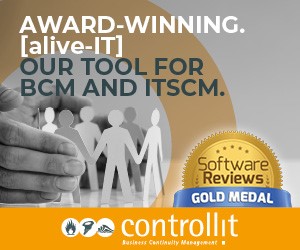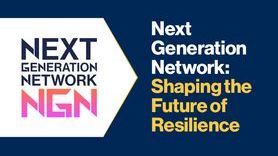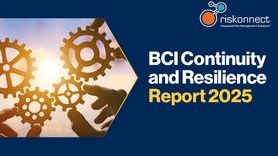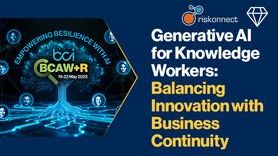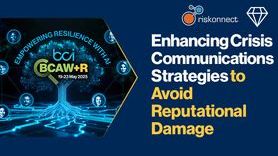Special Interest Groups and Forums: Exploring the potential

In this article, we will be exploring the BCI's new initiative - Member Special Interest Groups (SIGs) - in detail and showcasing three excellent uses of this member benefit.
SIGs have been designed to allow BCI members to connect with other professionals who share their interests in specific areas of business continuity and resilience. In order to best achieve this, two types of SIGs have been established: SIG Groups and SIG Forums.
- SIG Groups (SIGs) are formal and designed to be output-focused, providing practical and tangible outcomes to members.
- SIG Forums (SIFs) are focused on networking and discussion and are often time-bound and less formal.
For more information on the structure of both, please find the relevant Terms of Reference available below:
As we will explore in more detail below, SIGs can cover a broad range of topics, including defined attributes, as well as other areas relevant and present in the Business Continuity and Resilience fields, such as supply chain resilience, climate change, operational resilience, etc. Meanwhile, SIFs typically have a more specific purpose, providing networking and discussion opportunities.
SIGs and SIFs will allow members to collaborate and work together with other professionals on a common interest area of Business Continuity and Resilience on a global scale. Here, we will be taking a look at some exciting examples of SIGs and SIFs to show the range of what they can offer, why you will want to join (or lead) one, and what you’ll get out of it.
Brisbane 2032 – preparing businesses for a resilient Olympics: A SIF led by Anna Spicer AMBCI
“The idea of our Brisbane 2032 Olympic SIG Forum is to bring together the practitioners across Australia who are going to be involved in these magical events - the Olympics and Paralympics.”
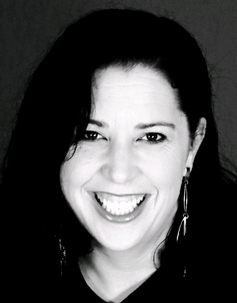
When the BCI spoke with Anna Spicer recently, we talked about the resilience challenges that may arise when hosting a summer Olympics. “We live in Queensland, so on any given day of the week, Mother Nature is trying to take us down” says Anna.
Therefore, when planning for a major event such as the Olympics, there will be surprises along the way that need to be considered. Anna notes that the region could have gone through another 10-year drought by 2032, resulting in severe water shortages, or alternatively, it may experience another major flood through the city’s central business district (CBD). Aside from the threats posed by extreme weather, Anna also mentioned the rate of growth required in the city.
“We are a fairly small regional city transforming into a very large one at a rapid pace. The pandemic encouraged a lot of people to move into the area and our infrastructure needs to keep up with the speed of growth. Going into the Olympics as well, it's just mind-boggling to consider the amount of change that we're going to have in the next decade.” says Anna. As such, she believes it is very important to build resilience into everything by design over the next 10 years, as well as keeping all of that change in mind and the opportunities that it can bring.
In this fast-changing environment, it is easy to see how a Forum with multiple voices across different sectors can help support the development of this resilience. On top of this, Anna notes that they “haven't heard a lot from our Olympics Committee in terms of business interruption yet” so they thought a Forum would be a good place to share any important bits of information that are being drip-fed across the multiple sectors involved in this large-scale event.
The idea is to also amplify the voices of practitioners and show that there is a vast amount of available experience in building resilience and showing what these practitioners can bring to the table. “Then, the Olympic Committee knows that there is a group of practitioners who are here to help and are on their side.” says Anna.
The Forum then plans to start reaching out to other cities that have had the experience of hosting an Olympics and begin to learn from them. On this, Anna says that the early stages of the Forum will see them start to contact teams which have worked on summer Olympics in the past and start to understand what was of value to them in the preparation process. After that, she wants “to reach out to our Olympic committee and ask what would be of value to them in terms of what information they might like to receive, how they might like to interact with us, what forums they're looking at setting up, etc, and getting into a regular rhythm of knowledge sharing for those first few years,” says Anna.
With the initial learnings in place, the plan is to build up to full-scale exercises, strategic planning around emergency management, and building a holistic response. With regards to Anna’s hopes for the Forum, she adds that “I would hope there would be a lot of collaborative working within the Forum to build our own practices within our own individual organizations using identified good practice and agreeing on how we interact with the disaster management practices, etc, locally.”
As mentioned in the introduction, Forums are often time-bound, much like this one which has been designed to cover the 10 years leading up to the games. After the initial steps set out above for the early stages of the Forum, Anna then plans to introduce knowledge-sharing workshop activities and start to get experts involved in panel discussions, amongst other resources.
According to Anna, the Forum will also be keen to build relationships across organizations and make sure that it is working with other streams that will be running in concurrence, such as in the physical security and emergency services fields, making sure that it is being holistic in its planning.
Indeed, a key part of the Forum will also be about providing knowledge and keeping it alive as practitioners cycle through the group during the 10-year period. For example, new practitioners, those who are just arriving in the Brisbane environment, or even those who are based across the entire Pacific region. She notes that, if they are involved in the Olympics in any way, they can be part of the SIG and find out more about the Olympics, so they know that there is an area where they can just ask a SME and get advice.
With regards to the format of the Forum, Anna is looking forward to the prospect of having a learning environment with expert panels and workshops, but also a less formal environment where new members are welcome to join and ask questions.
“That, to me, would be a real value-add because we can sometimes see a lot of the same names in the BC world from over the last 20 years,” says Anna. Indeed, Anna is keen to encourage a diverse range of new voices to join and feel included, while accessing the skillset of those with experience in this field.
For example, Anna says that an aim would be to have those who worked on the London Olympics, or other Olympics in the past, do an expert panel for practitioners in Australia, where new practitioners can submit questions and work through them with people who've done this before.
Finally, Anna hopes to come out on the other side of the Olympics experience with lots of advice and knowledge on a little corner of the world, but also develop a package of information that can be shared with the next Olympic city.
BCI Women in Resilience (SIG): A conversation with Baljeet Kaur CBCI, Committee Member
“When you understand that there’s a community that you can enter and be a part of, to share your experiences or learn from other experiences, it really helps.”
Baljeet Kaur CBCI recently joined the BCI Women in Resilience group as a Committee Member. As part of this, the BCI asked Baljeet a few questions about the continued importance of this group.

Baljeet notes that one of the core aims of the group is to “encourage women from all walks of life to be able to join the industry and to be confident enough to contribute.” On top of this, Baljeet adds that the group provides a platform for those already in the industry as well.
“I now have a platform where I can go and learn about what other women in the industry are doing or what challenges have they faced, which is very important,” says Baljeet.
It’s particularly important to have this group, according to Baljeet, because the resilience industry is growing and developing at pace but this group allows members to learn from women who've already been in the sector for a long time. “It's fresh to be able to hear stories about people who look like you, who have had similar experiences to you, from those who you can associate yourself with,” says Baljeet.
Going into further detail, Baljeet adds:
“For people who look like me or for people who don’t look like me, their struggles are so different and I think it’s important to be able to hear that and see what they’ve come through or the opportunities that came their way.”
Another aspect of the group, as others have mentioned in this article, is functioning at a global level. Through this, “we’re acknowledging that there are people who come from different walks of life, but also that there’s a space for allies as well to come and say how important it is to keep uplifting women in the industry and to keep it inclusive and keep it as diverse as possible,” concludes Baljeet.
APRA CPS 230 – Operational Resilience: a SIF led by Sharon Buckland MBCI
“The purpose of the Forum is to bring together organizations implementing and impacted by the new CPS 230 standard for Operational Risk Management in Australia.”
In a conversation with the BCI, Sharon Buckland MBCI explained the challenges that organizations may face in implementing the Australian Prudential Regulation Authority’s (APRA) new cross-industry regulations and how this new Forum will help.
The CPS 230 standard has reportedly been “designed to strengthen the management of operational risk in the banking, insurance, and superannuation industries.” According to Sharon, one of the challenges for practitioners is trying to implement it without the final standard being released, although the hope is that it will be published very soon. She also noted that the scope of the standard is quite broad and includes the uplift of risk management, business continuity, and the management of service providers. It looks at end-to-end critical operations and the restoration of those operations within pre-determined tolerance levels agreed at board level.
The regulations will of course have different challenges depending on the complexity of the organization. Therefore, the Forum will provide a place to discuss issues and share ideas regarding implementation and the on-going testing and governance of the standard. It will also consider the impact on organizations not directly regulated by APRA, but which are still having to comply with certain aspects as they are deemed ‘material service providers’ by a regulated entity.
Indeed, in the face of these challenges, “the idea of the Forum is not just to make it open to those impacted directly by the new regulation, but to provide a Forum so that those from different industries can contribute,” says Sharon. In terms of setting a cadence for the Forum meetings, Sharon explained that it will aim for quarterly meetings.
One of the key outcomes for SIFs as a whole is to bring people together to network and it appears this will also be a focus here, with Sharon noting that “the main purpose of the Forum is to share ideas, learn from each other, and build a network”.
We also discussed why this is a key element of this Forum. “Primarily, the Forum is about bringing people together,” says Sharon. By doing so, the Forum can also help reduce silos. “We can look at the standard, the implications, and challenges in one area and get them all on the table, and include service providers in those discussions to gain an understanding of their challenges.” I see the Forum as being a place for “productive networking,” adds Sharon.
Sharon also considers another area that may be of interest is testing: “The standard looks at end-to-end testing of critical operations. So, how do you test those? Do you test more and more components and then build up to the big end-to-end test?” The Forum will be an ideal place to discuss such topics and share ideas and thoughts. It also plans to consider the size of organizations, for example, what may work for large banks and may not be appropriate for smaller regulated organizations.
We also discussed how important it was for the Forum to learn lessons from regions already implementing Operational Resilience standards, such as in the UK and other parts of the world. The Forum is open to guest speakers from other countries so they can share their experiences implementing similar standards, adds Sharon. Although, APRA hasn’t called this operational resilience in the same way as the UK, Sharon notes, different regions around the world can still use the information generated within this Forum.
“I think other regions around the world that might have been watching the UK are now watching Australia and other countries moving to the operational resilience approach,” says Sharon, before concluding that “for a global institute, like the BCI, this will be a good Forum for those in the APAC region, and indeed for others around the world, to better understand operational resilience as well as to gain insight into some of the challenges faced when implementing a new standard.”

